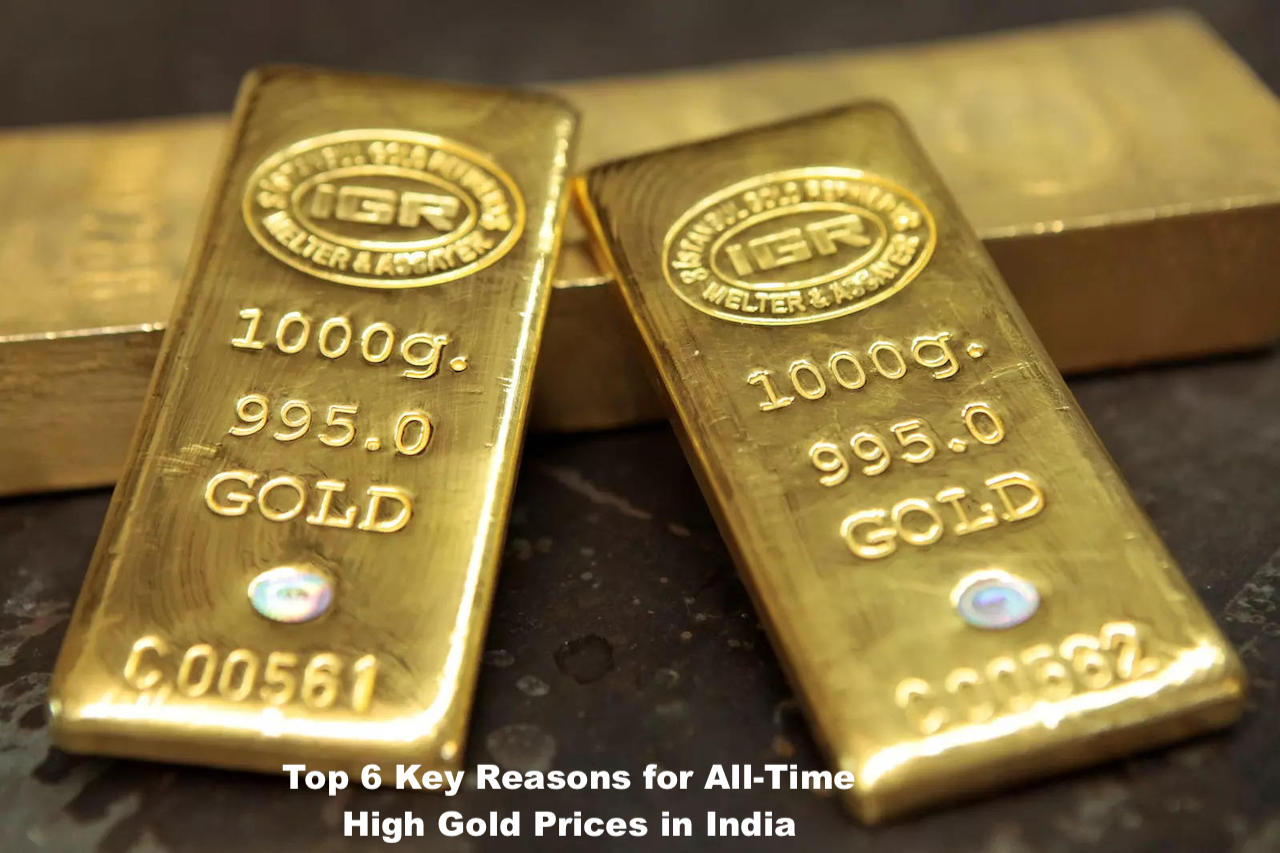The significance and sentimental value of gold in India is deeply rooted. With almost every household having gold in some form, metal is precious and preferred for many reasons. Apart from being a symbol of power and prestige for many, a primary reason why people across the country rely on gold is that it can be a great hedge against inflation.
Content in this Article
Top 6 Key Reasons for All-Time High Gold Prices in India
Why? Because it is a highly liquid asset, and the prices have been on the rise for a while now.Although the gold price in India was increasing slowly and steadily, the past few years have seen a huge surge in terms of price. Before the pandemic, the gold price in India was around ₹3,500 per gram.
Today the same has reached ₹5,700, which is also an all-time high price.This is a 60% increase in the gold value in less than four years. But why is the gold price on the rise? There are many reasons: economic fluctuations, gold reserves, demand, and more.
Advertisement
To understand the key reasons why the gold price in India is at an all-time high, read on.
6 Reasons Why Gold Price in India is on the Rise
Inflation and Recession
Inflation rates have been increasing, which has resulted in more and more people relying on gold. People rely on gold during inflation because, generally, other investment avenues don’t offer results that can beat the inflation rates.
On the other hand, gold has been known as a commodity that can help hedge inflation. In a recession, however, gold is known to be a safe haven as it performs inversely to the market.
With high inflation rates and a fear of recession, people have started investing heavily in gold. This has resulted in a general increase in the demand for the metal, resulting in high prices.
Increase in Demand
The mining of gold has reduced over the past few years. This has resulted in an imbalance in the demand and supply. And like other trading commodities, the demand and supply significantly impact the gold price.
As explained above, the demand for gold has been on the rise for numerous reasons. But with rising demand, the supply of gold has not increased. This has then resulted in a surge in price.
Government Reserves
Central banks reserve paper currency as well as gold. In India, whenever the Reserve Bank of India trades in gold, the impact is seen on the price. Trading of gold by RBI impacts the price because it impacts the cash flow and supply of resources.
When the RBI increases its gold reserves, i.e., starts buying gold, the gold price in India rises. Recently, RBI significantly increased its gold reserve, even being one of the largest buyers, resulting in a rise in the gold rate in Chennai and other states across the country.
Fluctuation in Currency
The price of gold has an inverse relation with the currency. Generally, as the currency weakens, people start buying gold, increasing the cost. People rely on gold during a weakening currency mainly because they want to place their best bet with the yellow metal, as it offers better security.
Another fluctuation in the currency is in the form of the exchange rate. Since India is one of the largest importers of gold, a rise in the exchange rate will also increase the gold price in India. Moreover, with the current economy being the way it is, people are increasingly inclined towards investing in gold.
Interest Rates
The gold price is also inverse to the interest rates at which investors get their returns. When the interest rates decrease, investors fear that their returns in other investment avenues may not be adequate and thus begin investing in gold.
On the other hand, when the interest rates rise, investors stay invested in avenues and possibly increase their investment in those instruments. Both of these factors increase demand, resulting in a price rise.
Although the current interest rates have risen, the overall economic condition and expectations have prompted people to invest in gold, increasing the gold price in India.
Jewellery Market
Like with other trading commodities, the gold market also impacts the price. The Indian Bullion Jewellers Association has a significant role in determining the day-to-day prices of gold.
The price determined by the association depends on numerous factors, including local demand. Since gold is a precious metal in India, it is often used in many festivals and celebrations. When this happens, a seasonal rise in demand results in an increase in the gold rate in Chennai and other states.
What is the Future Trend of Gold Price in India?
It’s no secret that the gold rate in Chennai and other states has risen in the last few years. The fluctuation in gold price results from various factors, some of which are interconnected. As such, predicting the future trend of the gold price in India can seem futile.
But looking at the current market trends and situations, experts suggest that the gold price in India will continue to increase in the year. Some even suggest that the price may go beyond ₹60,000 for 10 grams. This prediction of the rise is primarily due to the expected increase in the demand for gold and the fear of recession on a wider economic scale.
It is crucial to remember that these are just predictions, and timing the market to ensure that you get the best returns may not always be accurate. As such, your basic investment strategy should be the diversification of funds.
When you invest in different classes, you mitigate the risk of each asset, thereby ensuring the growth and security of your funds. So, conduct thorough research on other investment instruments and choose yours accordingly.

